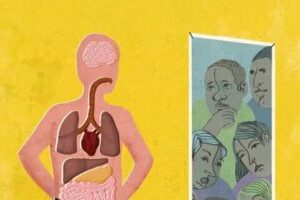From Yes! Magazine: “‘I never get angry,’ says a character in one of Woody Allen’s movies. ‘I grow a tumor instead.’ Much more scientific truth is captured in that droll remark than many doctors would recognize. Mainstream medical practice largely ignores the role of emotions in the physiological functioning of the human organism. Yet the scientific evidence abundantly shows that people’s lifetime emotional experiences profoundly influence health and illness. And, since emotional patterns are a response to the psychological and social environment, disease in an individual always tells us about the multigenerational family of origin and the broader culture in which that person’s life unfolds.
We human beings are biopsychosocial creatures whose health or illness reflects our relationship with the world we inhabit—including all the variables of family, class, gender, race, political status, and the physical ecology of which we are a part. A recent article from the National Institutes of Health called for a new foundational theory for medicine, based on a ‘biopsychosocial-ecological paradigm.’ Given the ideological limitations of mainstream medicine, this forward-looking initiative is not likely to be heeded soon.
As early as the second century, the Roman physician Galen noted the connection between emotional burden and illness, an observation repeated by many other clinicians over the centuries. The pathway from stressful emotions, often unconscious, to physical disease was often driven home to me as a family physician and palliative care practitioner, although nothing in my medical education even remotely hinted at such links. People I saw with chronic disease of all kinds—from malignancies or autoimmune conditions such as rheumatoid arthritis or ulcerative colitis to persistent skin conditions such as eczema and psoriasis, and neurological disorders like Lou Gehrig’s Disease (ALS), multiple sclerosis, Parkinson’s, and even dementia—were characterized by certain unmistakable emotional life patterns. Among these was the chronic repression of so-called negative emotions, especially of healthy anger, as in the Woody Allen character’s wry confession; an overriding sense of duty, role, and responsibility; an undue concern for the emotional needs of others while ignoring one’s own; and, finally, a core belief—again, often unconscious—that one is responsible for how other people feel and that one must never disappoint others. The expression ‘the good die young’ has—sadly—more validity than we sometimes appreciate.
Exemplifying the characteristic of an overwrought sense of duty, role, and responsibility, New York Times contributor Julia Baird recently reported her diagnosis with ovarian cancer. ‘I have always been healthy and strong,’ she wrote in a recent column. ‘I regularly do hot yoga and swim a two-kilometer stretch in a bay teeming with fish near my home in Sydney, all while caring for my two little kids, hosting a TV show, writing columns and making the final edits on the book I am writing.’ Inadvertently, Baird depicts precisely the ‘I can do anything, I’ll be everything to everybody’ multitasking persona I found in everyone I ever met with her particular malignancy. People are unaware, and their physicians rarely know to inform them, that such self-imposed stress is a major risk factor for disease of all kinds.
But is it purely self-imposed? It is not accurate to see it that way. A materialistic culture teaches its members that their value depends on what they produce, achieve, or consume rather than on their human beingness. Many of us believe that we must continually prove and justify our worthiness, that we must keep having and doing to justify our existence.
. . . During our dependent and vulnerable childhoods we develop the psychological, behavioral, and emotional composite that later we mistake for ourselves. This composite, which we call the personality, often masks a real person with real needs and desires. The personality is not a fault—in stressed environments it evolves primarily as a defense, a defense that can turn saboteur.
The separation of mind and body is an erroneous view, incompatible with science. Personality traits—that is, psychological patterns—conduce to disease because the brain circuits and systems that process emotions not only exert a profound influence on our autonomic nerves, as well as our cardiovascular, hormonal, and immune systems: In reality, they are all conjoined. The recent, but no longer new, discipline of psychoneuroimmunology has delineated the many neurological and biochemical mechanisms that unite all these seemingly disparate systems into one super-system.
. . . It is impossible to overstate the impact of childhood trauma on adult mental and physical health. Myriad studies have demonstrated that early-life suffering potentiates many illnesses, from mental ‘diseases’ such as depression, psychosis, or addiction to autoimmune conditions to cancer. One Canadian study demonstrated that childhood abuse raised the risk of cancer nearly 50 percent, even when controlled for lifestyle habits such as smoking and drinking.
Addictions in particular are responses to early trauma. Whether to drugs, food, gambling, or whatever other form they take, all are attempts to soothe stress and emotional pain. The first question is never why the addiction, but why the pain? We cannot understand the addictions that beset our society without recognizing the suffering and stress they are intended to alleviate, or the childhood trauma at their source. In this light, the obesity epidemic now facing us reflects primarily an epidemic of pain and stress.
Astonishing to say, most medical students never hear the word ‘trauma’ in all their years of training, except in the the sense of physical injury. ‘The medical profession is traumaphobic,’ a well-known colleague in San Francisco once told me. The results for patient care are devastating, whether in the treatment of physical or psychiatric conditions—a distinction that, given the mind/body unity, is in itself misleading.”
***
Back to Around the Web












